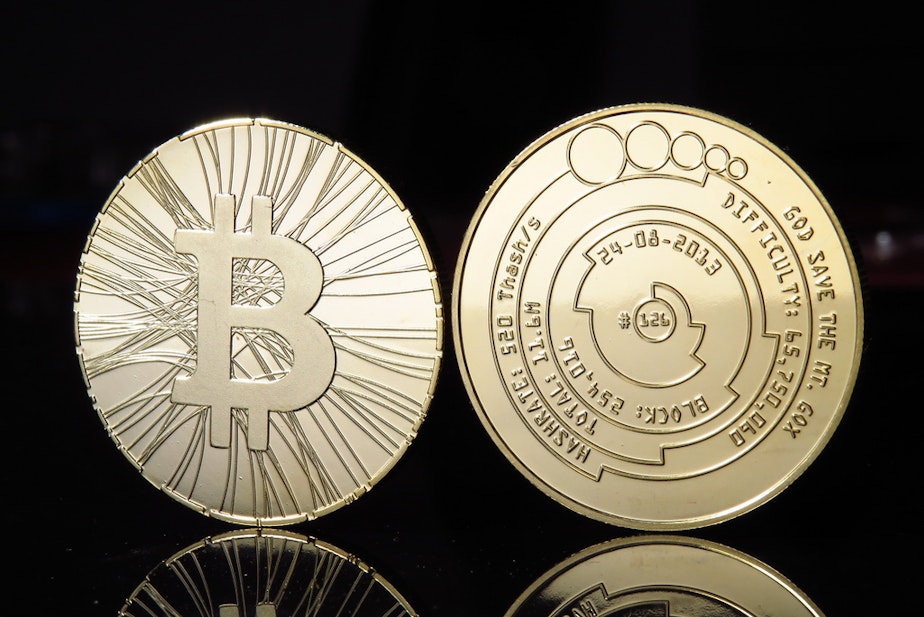Bitcoin: The Decentralized Virtual Currency That We're All Trying To Understand

Imagine using online banking – without the bank.
Bitcoin is a digital currency that was created five years ago. It runs entirely on the sways of the free market: no government or banking institution is backing it.
It’s starting to make more inroads into the mainstream: A local university recently accepted a donation in bitcoin, Washington’s marijuana businesses have been using it due to banking restrictions, and this week one of the top bitcoin exchanges closed due to reported theft.
So the question on everyone’s mind is, how does it work?
Forbes reporter Kashmir Hill spent a week living entirely on bitcoin. She moved into a hostel that accepted bitcoin, found a company that would rent her a bike because she couldn't use public transportation, and depended on a food delivery company to eat. She joked that she lost five pounds in that week from the biking, walking and lack of many food options: a regimen she termed "The Bitcoin Diet."
She spoke with KUOW’s Ross Reynolds on The Record to explain what bitcoin is and why it’s front and center in the news.
Crumbling MtGox
On Tuesday, MtGox went dark. The online bitcoin exchange was one of the first arrivers onto the bitcoin scene according to Hill.
It originally started as a place to trade Magic cards; MtGox is the acronym for Magic the Gathering online exchange. However, Hill said it was known to be a troubled exchange.
“A lot of people were kind of excited to see MtGox exit the scene because it was kind of an unprofessional exchange,” Hill said. “The CEO, Mark Karpeles, famously did an interview with Reuters where he was sitting on a bouncy ball and bouncing his way through the interview. And I think a lot of people don’t want those kinds of people as the face of Bitcoin.”
But the failure of MtGox doesn’t spell the end for the online currency.
“If MtGox were the bank that issued bitcoin, this would be a huge problem,” Hill said. “We don’t actually have a bitcoin exchange yet – a big one – in the U.S. But we found out this week that Second Market, which was famous for trading Facebook shares and Twitter shares before they went public, is going to launch a bitcoin exchange in the U.S. So it kind of feels like bitcoin is going to route around this disaster.”
Not Just A Novelty Item
Hill noted that there are pictures floating around of “bitcoins” – these aren’t the real currency, but rather novelty items on which a bitcoin code may be printed with a private key to unlock the value.
Bitcoin doesn’t have a physical manifestation, which can make it a difficult concept to grasp for those of us used to cash with a guaranteed value backed by a federal government. Instead, it is a decentralized virtual currency.
“I think the best way to think of it is as a huge public ledger,” said Hill. “And what’s happening is that anybody who enters the bitcoin system – buys bitcoin – gets value in that ledger. That really is what bitcoin is: moving value from here to here on ledger entries.”
Bitcoin is still a volatile system because the value is determined by the free market. The amount someone is willing to pay for it determines its value, so that value is changing all the time.
If that’s confusing for a consumer, it’s also causing headaches for governments. Hill noted that countries are grappling with how to treat bitcoin: like foreign currency, or a share or stock? Currently, people who are investing in the bitcoin system are expected to pay capital gains tax in the U.S., according to Hill.
True Value
But Hill said that focusing on the monetary value of bitcoin misses a greater point.
“The true value or benefit of bitcoin is the ability to move money from one place to another without paying transaction fees, or paying very low transaction fees,” she said. “So from that perspective, it doesn’t really matter what the value is, it just matters that it’s easy to change it into U.S. dollars here and easy to change it into RMB if you are sending it to China. The other stuff is kind of speculative and it’s a sideshow around bitcoin.”
Bitcoin also offers something that can have dubious implications: anonymity. So while the bitcoin system itself is transparent with each exchange recorded on a public ledger, Hill said that a person’s identity can be hidden if personal information isn’t attached to the bitcoin address.
Produced for the Web by Kara McDermott.

